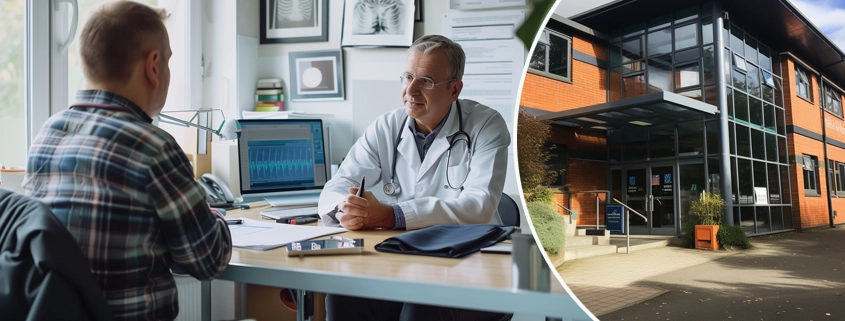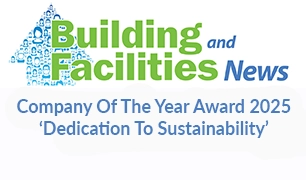GP surgeries are set to play a crucial role in achieving health sector net zero targets, but how can decarbonisation be achieved cost-effectively? Adveco looks at some of the best options available today to implement more sustainable practices.
The NHS has committed to two target dates for achieving net zero emissions: for emissions the NHS controls directly (the NHS Carbon Footprint) a net zero target of 2040 has been set, with an ambition to reach an 80% reduction through 2028 to 2032. For the emissions that can be influenced (NHS Carbon Footprint Plus) the target is net zero by 2045, with an ambition to reach an 80% reduction between 2036 to 2039.
These ambitious targets are being passed onto GP surgeries where transitioning to sustainable practices not only benefits the environment but should also aim to reduce long-term operating costs and promote well-being for patients and staff. Adveco can help provide a practical roadmap to navigate the journey towards net zero, with a specific focus on water heating as a strategic launchpad for broader sustainability gains.
The NHS continues to invest in new building work as part of an ongoing process of modernisation, but a large proportion of General Practice will be expected to continue using space within extant buildings. With that in mind, it’s important to understand where you are now to get to where you need to be most efficiently and cost-effectively. Setting a baseline is therefore the starting point, so begin with an energy audit, and analyse your surgery’s hot water demands and energy consumption patterns, especially identifying phases of peak use. You can assess your current carbon footprint using a host of tools, and the NHS offers guidance and examples, for water heating Adveco provides extremely accurate, low-cost, low-impact assessment that meters daily demands and enables a complete evaluation of your current hot water system (typically a gas boiler and/or immersion heaters) in terms of its energy efficiency, age, and suitability for your needs. Rather than estimating hot water use based on patient flow and staff activities, which is a typical approach usually characterised by misconception and inflated demand, metering provides absolute data that can act as a foundation for new system design that is sized correctly to your needs and can address net zero requirements for low carbon emission generation.
Water heating is a straightforward, low-impact place to begin improving sustainability, as most changes are likely to be contained to the plant/boiler room. External changes will be a result of the siting of renewables to help offset energy demands and operational costs. Upgrading a hot water system can be a fast, a matter of hours, project with minimal impact on clinical operations.
For GP surgeries with existing grid gas connections, an immediate advantage can be garnered from investing in high-efficiency water heating. Though not strictly in line with net zero thought replacing outdated systems with A-rated gas water heaters remains a commonly chosen option. One which can be further enhanced with the application of solar thermal pre-heat. It is well worth exploring the feasibility of integrating solar thermal panels with your hot water system to capture free solar energy for a proportion of the year. High-efficiency solar thermal collectors mean that a single panel could offset as much as 30% of the annual energy demands for hot water by a surgery. This option is particularly advantageous for surgeries with even a small amount of unused roof space with regular sun exposure and not occluded by trees or other buildings. Consistency of high-temperature water generation may be an issue for NHS estates, so much attention has been given to air source heat pumps (ASHPs) as an alternative source of preheat. ASHPs, particularly if powered by renewable electricity, offer significant efficiency gains and CO₂ emission reductions most of the year. Heat pumps have their strengths and weaknesses, which is why Adveco stresses the need for a hybrid approach to draw the best from a variety of technologies working together in a cohesive system to optimise energy use, hot water output and operational costs. In this way, renewables such as ASHP and/or solar thermal are deployed to provide pre- and mid-heat hot water which is then topped up to the required +60°C for safe daily operation by either gas or more preferably an electric boiler.
Additionally thought can be given to demand reduction measures, such as implementing water-saving measures like low-flow taps, showerheads, and aerators. It is also important to understand the value of promoting behavioural changes among staff and patients, encouraging shorter showers and responsible water usage.
Water heating is complex and inherently more costly usually due to oversizing of systems, however, these traditional capital investment costs are vanishing with the application of metering. And unlike space heating, there is no requirement to improve the building fabric, so you don’t need to retrofit a surgery with improved insulation, draught-proofing, or invest in new, more efficient ventilation systems. At least not right now. Moving forward these measures can significantly reduce heat loss and energy demands for space heating, but do not apply to hot water making upgrades relatively fast and painless.
Becoming sustainable in terms of hot water can be achieved overnight, with compact, low-emission systems such as Adveco’s FUSION E electric water heaters taking a matter of hours to install and be operational. This is a great way to begin engaging staff and stakeholders in a sustainability programme for a surgery. Engaging the staff is a critical element in making net zero a reality, real, overt improvement helps to educate and motivate staff on the importance of energy conservation and encourage participation in behavioural change initiatives. As part of a wider greener NHS, it also helps to share sustainability efforts with patients to foster community engagement and promote responsible healthcare practices.
Change comes with cost, both in terms of capital investment and operational costs. There is an overt opportunity to leverage government grants and financial incentives available for NHS organisations seeking to transition to net zero. Initiatives like the Salix Finance Green Loan Fund and the Public Sector Decarbonisation Scheme offer valuable support, but making your case for smaller projects can be difficult, this is why a metered project is so advantageous. For a very small investment, less than £1000, the data provides proof of concept and extremely cost-effective options that save thousands of pounds, all of which can help secure all important grant money to deliver a project.
As the process develops regularly tracking energy consumption and carbon footprint after implementing changes is recommended. This gives you the ability to compare against baselines and measure system progress against the theoretical modelling and so identify areas for further improvement. This is especially advantageous when communicating net zero achievements with stakeholders and through annual reports generating transparency to foster accountability and encourage learning within the wider NHS community.
Remember, achieving net zero is a continuous journey, not a one-time destination. By starting with water heating, embracing broader sustainability measures, and actively engaging stakeholders, GP surgeries can play a pivotal role in building a more sustainable future for the NHS and healthier, more energy-efficient workplaces for both staff and patients.
Visit Adveco’s healthcare support pages for further information.
















